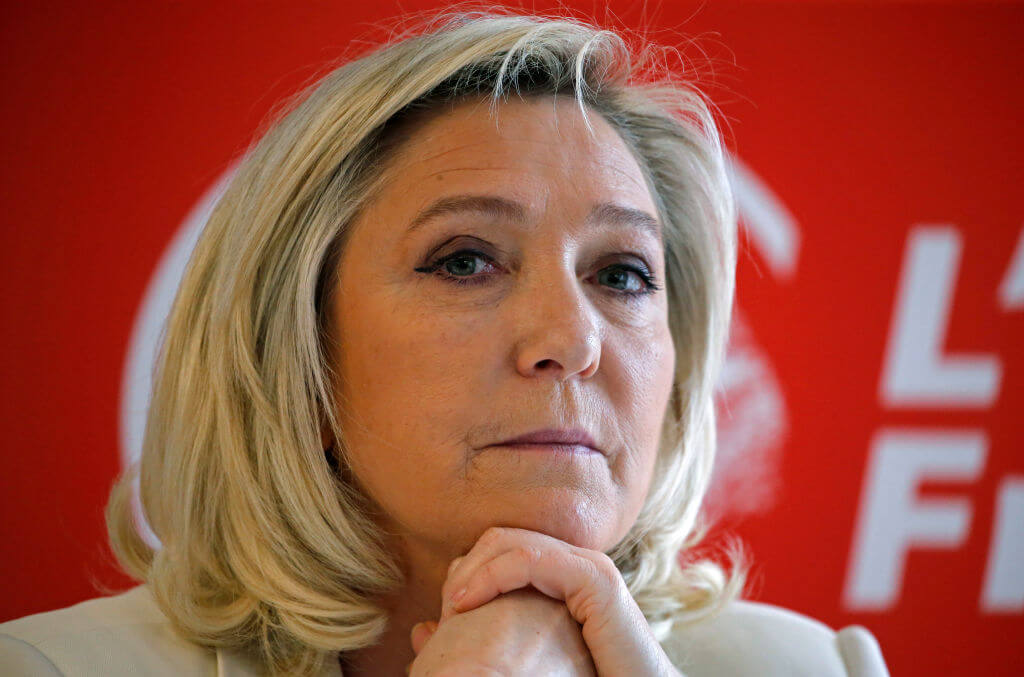Jewish leaders express relief at Le Pen’s defeat, warn of new battle ahead in France
President Emmanuel Macron may have defeated his far-right rival relatively comfortably in Sunday’s runoff, but the Jewish community says the hard work lies ahead: ‘The progress Marine Le Pen has made is frightening.’

Marine Le Pen at a news conference on March 22, 2021 in Paris, France. Photo by Getty Images
This article originally appeared on Haaretz, and was reprinted here with permission. Sign up here to get Haaretz’s free Daily Brief newsletter delivered to your inbox.
PARIS – Relief was the first emotion expressed by French-Jewish community leaders after centrist incumbent Emmanuel Macron beat Marine Le Pen in the presidential runoff on Sunday.
“It’s a relief to see that Marine Le Pen was blocked from reaching power – but this time we were seriously worried,” said Francis Kalifat, head of the French Jewish umbrella body Crif.
“We were concerned because some people, like [far-left presidential candidate] Jean-Luc Mélenchon, who got 22 percent in the first round of voting, had made ambiguous statements, refusing to call on their supporters to vote for Macron.”
National Rally leader Le Pen’s 41.5 percent was the highest ever achieved by a far-right party in France. Samuel Lejoyeux, head of the Union of Jewish Students of France, said that while he also felt relief at the result, “this is no victory. The main thing is that Marine Le Pen and her racist and antisemitic project have been kept out of the Élysée Palace, but the progress she has made is frightening.”
Many Jewish voters were wary of Le Pen despite her efforts in recent years to distance herself from prior comments made by her father, Jean-Marie Le Pen, who has been convicted several times for contesting crimes against humanity. Jewish leaders said they believed that efforts to soften her image, which have been referred to as “de-demonization,” were just a strategy.
“When you have the kind of heritage Marine Le Pen has, you can move away from it – but you have to do so very clearly, and she hasn’t,” said lawyer Muriel Ouaknine Melki, who heads the European Jewish Organization. “On the contrary, she still has the same networks as her father when he was party leader. The same people in charge of her security and the party’s finances. She’s surrounded with people who have close contacts with antisemitic comedian Dieudonné and used to have with [the late] Holocaust denier Robert Faurisson.
“Her decision to drop the ban on ritual slaughter and the kippa before the vote is purely a facade,” said Melki, referring to Le Pen’s pledge to outlaw the wearing of the Muslim headscarf in public but not the kippa.
Jewish leaders argued that the only way to stop the far right’s rise is to address the problems that drove so many to vote for Le Pen. “Macron’s victory is good for France and French Jews, but Le Pen’s share of the vote was very high – and this means there is a lot of work to do,” said Crif’s Kalifat.
“The government holds a great responsibility; it must find answers to people’s concerns on the cost of living and lack of security – that’s the only way to make extremist parties lose ground,” he said. “And it’s not just the far right: the far left is also a threat. Together they got some 60 percent of the vote in the first round,” he added.
In his victory speech, Macron said he recognized that he must realign his presidential platform because so many people voted for him to keep Le Pen out. He said he would make France a fairer place and aim to do a better job hitting targets with regard to climate change. “I’m no longer the candidate of one side but the president for everyone,” he said.
Jewish student leader Lejoyeux said that for Macron to counter extremist ideologies, “he must step up his policies against antisemitism and Islamists.”
Macron’s Forward! party will head to the polls again in June for the parliamentary elections. Le Pen, Éric Zemmour and Mélenchon have vowed to build their groups and take control of the decision-making process in Parliament.
“A new battle begins now,” Kalifat said. “The French electoral system of majoritarian voting does not benefit small parties, but everything will depend on the alliances parties make.”
Lejoyeux also sounded the alarm on the upcoming elections. “We will be watching traditional mainstream politicians who are tempted to make some kind of alliance with extremist parties – some socialists have already tried to get Mélenchon to accept them into his alliance. Red lines need to be imposed for such alliances,” he added.
This article originally appeared on Haaretz, and was reprinted here with permission. Sign up here to get Haaretz’s free Daily Brief newsletter delivered to your inbox.






















